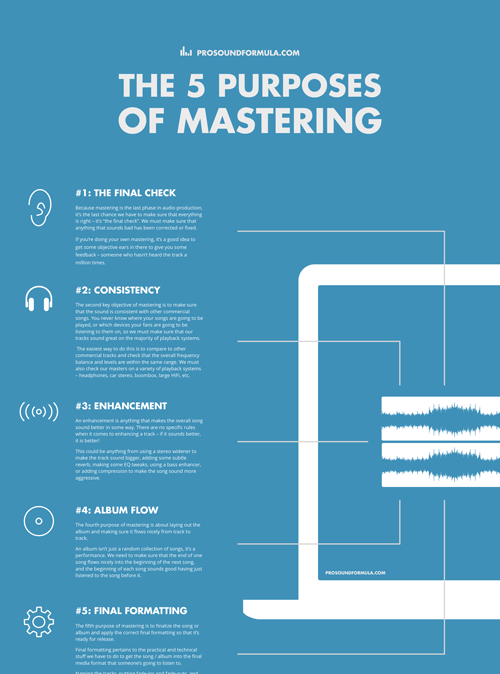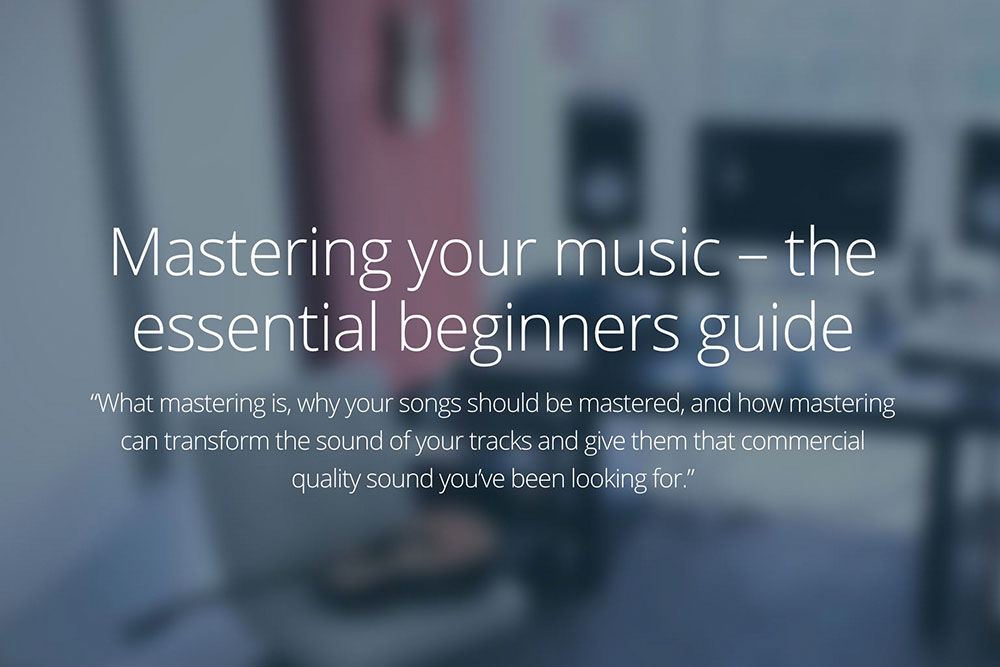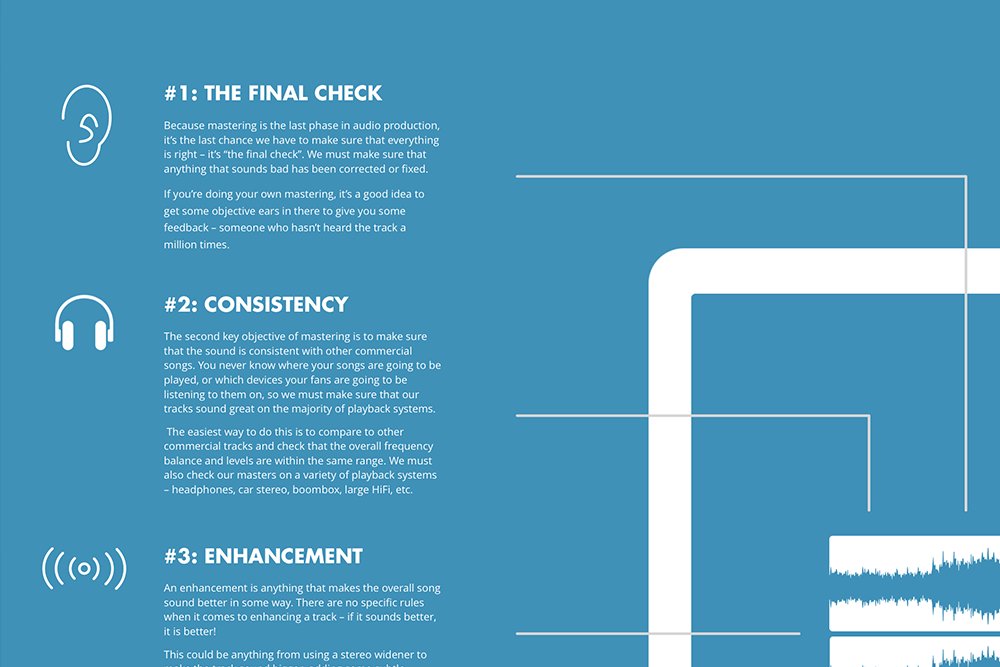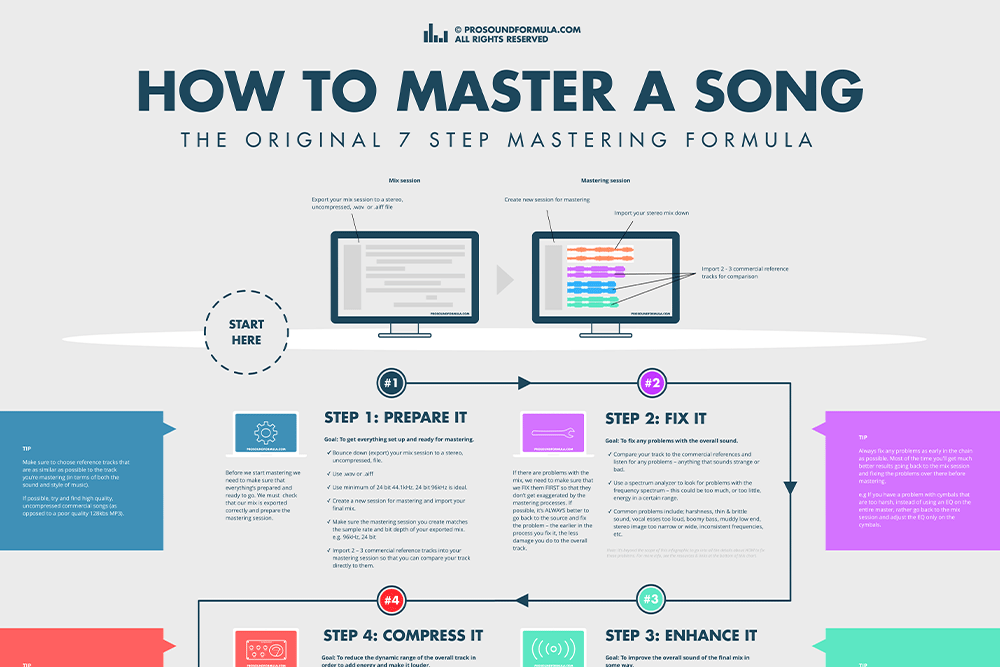The 5 purposes of mastering
There are essentially 5 things we must accomplish to get a complete, commercial quality, master. Before you can learn HOW to do something, you must know WHY you are doing it so that you know what you’re going after.
Download the 5 Purposes of Mastering Infographic
Want a simple summary of the five purposes of mastering? You got it. Download this infographic to keep you focussed and on track while mastering your songs. Click the big red button below to download it now – it’s free :)
Mastering isn’t random, mysterious, or accidental (as much as some professional mastering engineers may want you to believe that). There are very specific objectives that we need to accomplish in every mastering session in order to be able to say, ‘this track has been mastered’.
Now let me ask you this – if you don’t know what these specific objectives are, how can you ever achieve them?!
Don’t worry, I’m not picking on you ;) You’re one of the very few people actually taking the time to figure this out properly. For a long time my idea of mastering a song was to ‘make it sound cool’, or to ‘make it sound loud’ …and that’s about where it ended. While both these things may be worthwhile goals, they’re only one part of mastering.
The bottom line is, most people have no idea what they’re supposed to be doing while mastering their music and so they never get anywhere. The good news is, this will no longer be you! I’m going to show you what the five specific purposes of mastering are so that you’ll know exactly what you need to accomplish while mastering your tracks.
![]()
#1: The final check
The mastering phase is the last chance we have to check the track for any problems and make sure that it’s ready to be released to the world.
The first key objective of mastering is to make sure the music doesn’t have any problems and it sounds the way we want it to.
The ‘final check’ simply means the last chance to check the track for any mistakes or problems. Because mastering is the last phase in the audio production process, this is where we have to make the final call about the song or album.
After the track is mastered it’s sent out to the world and can’t be changed (well, it could be changed, but you can never get back all the copies that have been duplicated or downloaded).
“If you’re doing your own mastering, it’s a good idea to get some objective ears in there.”
If you’re doing your own mastering, it’s a good idea to get some objective ears in there – someone who hasn’t heard the track a million times. It’s amazing how quickly we lose perspective after listening to something over and over again. Often it’s the most obvious things that we totally miss.
Unfortunately, we can’t ‘un-listen’ to something, so the only two options are;
1. Take a break and come back to it after a few hours / days / weeks (depending on how sick of listening to it you are!)
2. Ask some musician friends to take a listen and give you their first impressions.
A little word of advice on asking for feedback… don’t ask someone, ‘What do you think is wrong with this?’. It sets you up for failure because they will look for something wrong, and often come up with the most random things that are completely irrelevant. If you ask someone to spot all the problems, they’ll look for things just because they don’t want to come across as stupid or unaware.
All you need are some honest first impressions, so just give the song to a few people and tell them to let you know what they think. Also, always keep in mind that no one is truly objective, so just take all comments with a pinch of salt.
![]()
#2: Consistency
The second key objective of mastering is to make sure that the sound is consistent with other commercial songs.
The second thing we must make sure that all our masters have is something I call ‘consistency’. All this really means is that the sound of our music is relatively consistent from one playback system to the next.
Have you ever listened to one of your songs and thought it sounded cool on one system, but then sounded terrible on another? Yet commercial songs sound great played back on pretty much any system. This is what ‘consistency’ is all about.
You never know where your songs are going to be played, or which devices your fans are going to be listening to them on, so we must make sure that our tracks sound great on the majority of playback systems. The easiest way to do this is to compare to other commercial tracks and check that the overall frequency balance and levels are within the same range.
I’m not going to sugar coat it – this is often the most challenging part of mastering. But with the right training and a bit of practice, you’ll be on top of this in no time!
Let me give you a few examples and I think it will already start making more sense…
“We must make sure that out songs are consistent with other commercial tracks so that they sound great no matter where they’re played.”
Consistent frequency balance – If you picked a couple of commercial songs from different musical genres and played them one after another, you’d notice that they all have a similar tonal balance. Sure, a dance song will have more bass than a folk tune, but it’s not so drastic that you have to change all your settings to compensate for it. This is no accident. In the mastering phase, we need to make sure that the overall frequency balance is within the same range as other similar commercial tracks so that it will sound consistent when played back on various systems.
Consistent mix – Say for example the bass line in a song is very important, it’s the main hook. An important question we need to ask is, ‘if someone plays this song back on their laptop, are they going to be able to hear that bass line?’.
If the song has a lot of sub bass but not enough low-mid range bass, it may sound big and fat on systems with a subwoofer, but smaller systems can’t reproduce the sub bass and the bass line may as well not even be in there. In a case like this, we may need to use an EQ or bass enhancer to add some low-mids in order to get the bass to cut through on smaller systems.
Consistent levels – Consistency can also apply to level consistency. If a song has too much dynamic range (very soft and very loud parts) the listener may have to keep adjusting their volume which can become annoying. Dynamic range is very genre dependent so the main thing is just to compare your levels with other tracks of a similar style.
The bottom line is, if our songs are consistent with commercial standards, they’ll sound consistent on the majority of playback systems.
![]()
#3: Enhancement
The third purpose of mastering is to improve the sound of the overall song.
An enhancement is anything that makes the overall song sound better in some way. There are no specific rules when it comes to enhancing a track – if it sounds better, it is better!
This could be anything from using a stereo widener to make the track sound bigger, adding some subtle reverb, making some EQ tweaks, using a bass enhancer, or adding compression to make the song sound more aggressive.
“An enhancement is anything that makes the overall song sound better in some way.”
Loudness could also be an enhancement. Most artists / record companies want their music to be as loud as possible because they think that this will give the track an edge. Despite the whole ‘loudness war’ debate, I’m not the one to judge whether this is good or bad – it’s your music and you get to decide. If you think louder is better, then it’s better.
There really are no rules, and you often don’t know whether something will work or not until you try it. So my advice is to simply try a couple of different plugins, and then switch between bypassing and enabling various combinations to hear whether it makes a significant improvement or not.
Always keep in mind that when it comes to mastering we’re focussed on the overall sound, so you should only add things that benefit the entire song, not just one or two instruments. For example, a bass enhancer plugin may make the low end sound fat, but if it makes the vocals sound muddy or boomy it’s not worth putting on. If you really want to fatten up the bass it’s best to then go back to the mix session and add it only to the bass track.
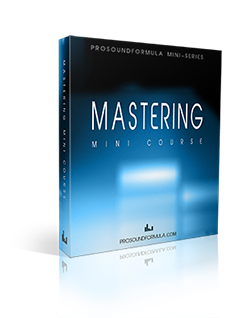
Sign up for the Mastering Mini-Course
Join me for my Mastering Mini-Course where I'll be sharing with you some of my best tips, tricks, and insights, into producing great sounding masters from home. Did I mention it's totally free? :) Click below to find out more.
![]()
#4: Album flow
The fourth purpose of mastering is about laying out the album and making sure it flows nicely from track to track.
Although iTunes and music streaming services have taken over the world, and singles are the new hot thing, I don’t think the album is ever going to go away. The real fans always buy the album. Think about it, no matter how great a song is, you can only listen to it so many times before you get sick of it!
That said, if you’re making an album, there’s a lot more to it than just throwing the song’s on a disc and clicking the ‘burn’ button. (Do people still burn CD’s?)
“An album isn’t just a random collection of songs, it’s a performance.”
Think about a live concert you’ve been to, the basic format probably went something like this: A couple of louder songs up front, some slower ballads in the middle, and then ending off with a few big numbers. If there’s an encore, they’ll often play a couple more songs and then round off the set with a mellow track to calm everyone down and end off the evening.
You could think of the flow of an album in a similar way. An album isn’t just a random collection of songs, it’s a performance. We need to make sure that the end of one song flows nicely into the beginning of the next song, and the beginning of each song sounds good having just listened to the song before it.
You may have noticed that on some albums the tracks flow seamlessly from one to the next (especially live albums), while most studio albums typically have a two second space between tracks.
The cool part is, it’s your album and you get to decide :)
![]()
#5: Final formatting
The fifth purpose of mastering is to finalize the song or album and apply the correct final formatting so that it’s ready for release.
Final formatting pertains to the practical and technical stuff we have to do to get the song / album into the final media format that someone’s going to listen to.
Naming the tracks, putting fade-ins and fade-outs, and saving to the desired format are common things that have to get done during the mastering phase.
“Putting a very short fade-in at the start, and fading out the end, it will make the transitions sound a lot smoother.”
We want to make sure that each track starts and finishes seamlessly. By putting a very short fade-in at the start, and fading out the end, it will make the transitions sound a lot smoother. You don’t want hear the fade, you’re basically just fading in and out the track hiss. (If you listen on headphones at a high volume you’ll notice that there’s some natural noise just before the song starts and right at the end when the music fades out, that’s what I’m talking about)
A little tip to keep in mind, most CD players tend to cut off the first few milliseconds of a track. So you want to account for that by putting in a little bit of space right at the beginning. Whether or not your songs will get played on a CD, it’s best to be on the safe side. I generally add in between 100ms – 500ms of blank space before the actual music starts. (If you import some commercial tracks into your software you should notice the same)
In terms of bit depth and sample rate, the industry standard is still ‘CD quality’ which is 44.1kHz, 16bit. If you’re selling your songs as digital downloads, export your master at these settings and then make MP3’s (or whatever format you want) from that. If you are making digital downloads, make sure to embed tags with the artist and song info, album art, etc.
Learn more…
Mastering Your Music – The Essential Beginner’s Guide
Learn what mastering is, why your songs should be mastered, and how mastering can transform the sound of your tracks and give them that ‘commercial quality’ sound.
The 5 Purposes of Mastering
There are essentially 5 things we must accomplish to get a complete, commercial quality, master. Before you can learn HOW to do something, you must know WHY you are doing it so that you know what you’re going after.
How to Master a Song – Simple 7 Step Mastering Formula
Learn how to master your songs using my simple 7 step mastering formula. Make your masters sound loud, fat, and full, just like your favorite commercial tracks…

